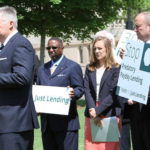WASHINGTON (RNS)—When comedian Stephen Colbert brought his act to Capitol Hill last month and stole the spotlight with his satirical shtick, no one was more surprised than lawmakers.
“You run your show,” House Judiciary Committee Chairman John Conyers scolded him. “We run the committee.”
When Colbert finally let his well-coiffed hair down and got serious about the “really, really hard work” done by migrant farmworkers, even more people were surprised when the funnyman gave a glimpse of his private faith.
|
Comedy Central’s Stephen Colbert has used his Colbert Report to make fun of religious institutions, even as he remains a man of deep and devout faith. (RNS PHOTO/Courtesy of Scott Gries/Comedy Central)
|
“And, you know, ‘whatsoever you do for the least of my brothers,’ and these seem like the least of our brothers right now,” Colbert said, quoting Jesus. “Migrant workers suffer and have no rights.”
It was a different kind of religious message than Colbert typically delivers on Comedy Central’s The Colbert Report, where he often pokes fun at religion—including his own Catholic Church—in pursuit of a laugh.
Yet it was the kind of serious faith that some of his fellow Christians say makes him a serious, covert and potent evangelist for their faith.
“Anytime you talk about Jesus or Christianity respectfully the way he does, it is evangelization,” said Jim Martin, the associate editor of the Jesuit magazine America, who has appeared on Colbert’s show four times. “He is preaching the gospel, but I think he is doing it in a very post-modern way.”
Colbert’s on-air persona is a bloviating holier-than-thou conservative whose orthodox Catholicism is part of what makes him funny. On air, Colbert has chided the pope as an “ecu-menace” for his outreach to other faiths, referred to non-Catholics as “heathens and the excommunicated” and calls those who believe in evolution “monkey men.”
Diane Houdek has tracked Colbert’s on-air references to Catholicism on her blog, Catholic Colbert. When he recites the Nicene Creed or Bible verses from memory, it shows how foundational his faith is, she said.
Sign up for our weekly edition and get all our headlines in your inbox on Thursdays
“He is moving in an extremely secular world. It is hard to get a lot more secular than Comedy Central,” Houdek said. “Yet I feel he is able to witness to his faith in a very subtle way, a very quiet way to an audience that has maybe never encountered this before.”
It’s particularly powerful to Catholics, Houdek said, when the lines blur between Colbert’s personal faith and that of his on-air alter ego.
She pointed to a 2007 segment in which his character reveled in Pope Benedict XVI’s statement that non-Catholic faiths were “defective.”
“Catholicism is clearly superior,” Colbert crowed beside a picture of the pope. “Don’t believe me? Name one Protestant denomination that can afford a $660 million sexual abuse settlement.”
It wasn’t just funny, Houdek said, but also powerful. “He really made a strong criticism of the church.”
Colbert’s personal opinions about Catholicism usually are not so clearly displayed, and his range of guests offers few clues. Guests have ranged from the theological left—openly gay Catholic writer Andrew Sullivan—to the conservative Catholic League President William Donohue.
Houdek regularly fields comments from readers who believe they’ve found a fellow traveler in Colbert.
“You can’t pin him down,” Houdek said. “He becomes kind of a Rorschach test for what the viewer’s beliefs are.”
David Gibson, a Catholic writer who covers religion for PoliticsDaily.com, said Colbert’s ability to present his character and himself at the same time is where his strength as a Christian role model lies.
“I think what he models most effectively is the talent for discernment,” Gibson said. “He shows what is important to the faith and what can genuinely be debated and disparaged.”
Kurt C. Wiesner, rector of All Saints Episcopal Church in Littleton, N.H., writes a blog about religion and popular culture. Watching Colbert’s congressional testimony, he saw something that reaches beyond Catholicism.
“He offered a human witness, without a doubt,” Wiesner said. “He gave witness to what Christians are often called to do, but the message isn’t be a Christian like him. It is that one’s faith calls us to be engaged with our fellow human beings.”













We seek to connect God’s story and God’s people around the world. To learn more about God’s story, click here.
Send comments and feedback to Eric Black, our editor. For comments to be published, please specify “letter to the editor.” Maximum length for publication is 300 words.